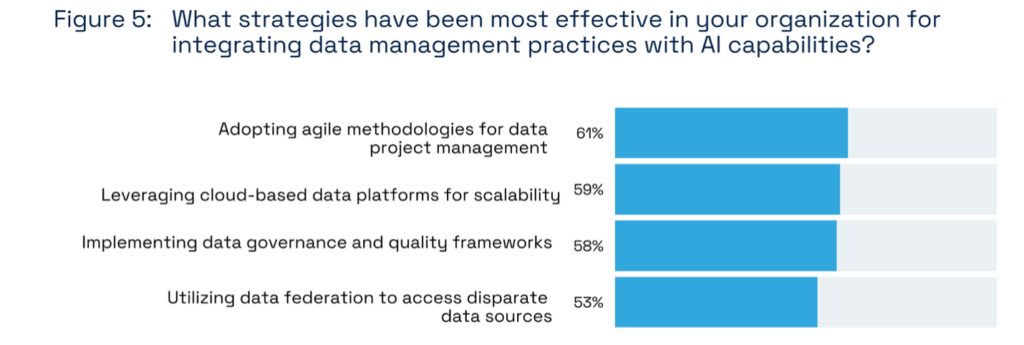As organizations race to incorporate artificial intelligence (AI) into their operations, one element is proving to be absolutely essential: effective AI data management strategy. A recent research report examined the state of data management and how it impacts AI development. The results offer critical insights for business leaders navigating today’s rapidly evolving AI environment.
The study surveyed 300 IT professionals who are directly involved with enterprise data management and AI initiatives. Of those surveyed, 51% were CTOs, 25% were software engineers, and the remaining included data engineers and architects. Participants came from a range of sectors—financial services, retail, tech, manufacturing, and telecom—at organizations varying in size from 500 employees to 5,000 and beyond. The majority were based in the U.S. and Western Europe.
The State of AI Readiness and the Role of Data
Before diving in, I anticipated a high level of excitement around AI—and the data confirmed it. An overwhelming 87% of companies expressed a strong or very strong intent to roll out AI solutions in the next year. Even more encouraging: 86% are already making significant headway in implementing their AI strategies.
The top drivers behind this momentum include:
-
Boosting operational efficiency (87%)
-
Gaining better business insights (77%)
-
Driving innovation (74%)
However, enthusiasm doesn’t eliminate roadblocks.
The Major Obstacles Holding AI Back
Several consistent challenges surfaced in throughout the research:
Challenges in Data Organization. More than half of the respondents said they face difficulties in organizing structured data for machine learning (52%) and unstructured data for retrieval-augmented generation (50%).
Data Security and Privacy. Concerns over data privacy and security emerged as the number one barrier (28%) to accessing quality data for AI. Data volume came in close behind at 25%.
The Need for Real-Time Data Access. An impressive 62% said real-time access to data is an area demanding urgent attention for AI to thrive, while 65% ranked it as critical or highly important.
Data Silos Across the Enterprise. Scattered data is another key issue. With information spread across multiple systems—on-premises and across various cloud platforms—many businesses are struggling to consolidate their data effectively. Respondents are addressing this by centralizing data in lakes (47%) and leveraging hybrid data federation strategies (47%) to enable more seamless access.
These findings drive home a critical insight: strong data management isn’t just a backend concern—it’s foundational to achieving success with AI.
Aligning Your AI Data Management Strategy with Innovation Goals
Companies that are aligning their data practices with their AI initiatives are seeing better outcomes. A full 90% of respondents said their data management strategies are either somewhat or very well aligned with their AI innovation objectives.
To overcome the hurdles and accelerate AI adoption, companies are turning to a mix of smart strategies:
-
Data Governance and Access Controls: 52% are implementing federated access and governance frameworks.
-
Cloud Solutions: 59% are leaning on cloud infrastructure to scale AI efforts.
-
Agile Practices: 61% have adopted agile methodologies for managing data projects.
-
Data Federation Techniques: 53% use data federation to streamline access across diverse sources.
Alongside these methods, many IT leaders (58%) are prioritizing data quality and observability tools to ensure consistency, reliability, and readiness for AI workloads.

Creating a Data-Centric Culture
One of the most important takeaways from the study? Building a culture that understands and values data is essential. In fact, 90% of respondents believe better data literacy would at least moderately improve AI project outcomes—with 40% saying the impact would be significant.
That means educating teams, emphasizing the strategic importance of data (69%), and encouraging cross-functional collaboration (66%) are all non-negotiable in today’s data-first world.
Every employee, regardless of department, plays a role in how data flows through the organization. Success with AI requires this kind of holistic mindset.

What’s Next for Data and AI
Looking ahead, a few trends are poised to reshape the AI landscape:
-
Ethical Data Practices: With AI’s growth, there’s an increasing need for ethical, responsible data use.
-
Federated Learning: Cited by 17% of respondents, this approach allows AI models to train on distributed data while maintaining privacy.
-
Real-Time Processing: Fast, efficient data access and processing are becoming must-haves.
Recommendations for Leaders
Here’s what I advise for organizations looking to future-proof their AI strategies:
-
Double Down on Governance and Security: Build strong frameworks to protect data and ensure it’s of high quality.
-
Invest in Real-Time Capabilities: Real-time data access is becoming critical—organizations must adopt the infrastructure that supports it.
-
Nurture a Data-Driven Culture: Elevate data literacy and collaboration throughout the organization.
-
Use Cloud and Federation Wisely: These tools offer the scalability and flexibility AI projects demand.
-
Stay Flexible: Use agile principles and modular architectures to keep pace with AI innovation.
Final Thoughts
AI isn’t just on the horizon—it’s here. But the organizations that truly thrive will be the ones that embed strong data management into every aspect of their AI strategy. When data becomes a strategic asset rather than a bottleneck, the possibilities for innovation, efficiency, and insight are limitless.
For those who want to dive deeper, I highly recommend reading the full report: The State of Data Management and Its Impact on AI Development.
